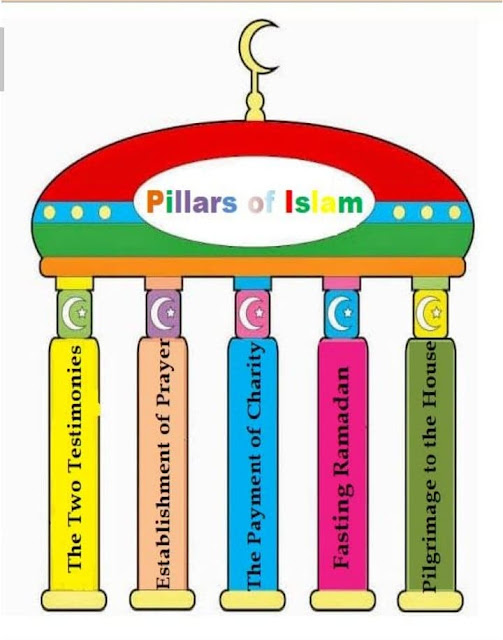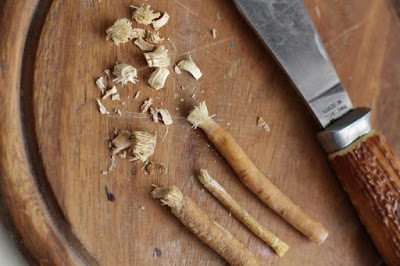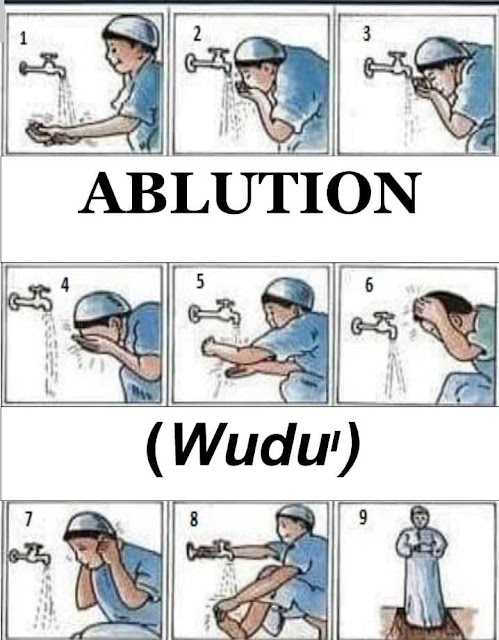(PRAYER (Salah
It is words and deeds which begin with (Takbeer)
which means saying “Allah is the Greatest
(Allaahu Akbar)”, and end with prayer-end greeting (Tasleem).
The five prayers have been made obligatory in
Makkah in the Night Journey of Prophet Muhammad from Makkah to Jerusalem and
his Ascent to the Seventh Heaven, when he reached to the Lote Tree of the
farthest limit (Sidrat AL-Muntaha).
God says ﴾Certainly the believers have succeeded(1)They who are during their prayer humble﴿(2) And says ﴾And they who carefully maintain their prayers﴿ And says ﴾And enjoin prayer up on your family [and people] and be steadfast therein﴿.
God says ﴾Certainly the believers have succeeded(1)They who are during their prayer humble﴿(2) And says ﴾And they who carefully maintain their prayers﴿ And says ﴾And enjoin prayer up on your family [and people] and be steadfast therein﴿.
●It was narrated from Anas ibn Malik
that the Prophet (P.P.B.U.H) said, “Allah enjoined fifty prayers upon my nation (Ummah), and I had been going back
to Him and asking Him for reduction till He made them five prayers every day
and night.” [The Two Scholars].
Upon Whom Prayer is Obligatory?
It is obligatory on the rational
adult Muslim (male or female). However, the command of performing it begins at
an early age, so that the Muslim accustoms to it from his childhood.
It is the responsibility of parents
in this stage of their child’s life till he becomes an adult at the age of
eleven or thirteen, then their charge will be providing advice, and applying “Carrot
and Stick” approach.
●It was narrated from Amr ibn Shuᶦaib (May Allah be pleased with him) that the Prophet said: “Command your children to perform prayer when they are seven years old, and beat them for (not performing) it when they are ten, and do not let (boys and girls) sleep together.” [Abu-Daoud].
●It was narrated from Amr ibn Shuᶦaib (May Allah be pleased with him) that the Prophet said: “Command your children to perform prayer when they are seven years old, and beat them for (not performing) it when they are ten, and do not let (boys and girls) sleep together.” [Abu-Daoud].
Prayer is The Most Important Pillar of Islam:
Many Prophetic and Sacred traditions are provided in priority and
importance of the five prayers, and in warning against leaving or neglecting
them. They were one of the Prophet’s priorities. When it was time to pray, the
Prophet used to say, “O Bilal, give us comfort
by it.” He also said,
“My comfort has been provided in prayer.”
And if he had a
distress, he used to pray and talk intimately to Allah. The Prophet’s last
words (recommendation), before his death, were: “Prayer and those your right hands possess (slaves)... Prayer and those your right hands possess."
𓈇𓈇𓈇𓈇𓈇𓈇𓈇𓈇𓈇𓈇𓈇𓈇𓈇𓈇𓈇𓈇𓈇𓈇𓈇𓈇𓈇𓈇𓈇𓈇𓈇𓈇𓈇𓈇𓈇𓈇𓈇𓈇𓈇𓈇𓈇𓈇𓈇𓈇𓈇𓈇𓈇𓈇𓈇𓈇𓈇𓈇𓈇𓈇𓈇𓈇𓈇𓈇𓈇𓈇𓈇𓈇𓈇𓈇𓈇𓈇𓈇𓈇𓈇𓈇𓈇𓈇𓈇𓈇𓈇𓈇
Why are the Five Prayers the Most Important Pillar of Islam
❶They are the only pillar that the
Prophet has received from God directly from above seven heavens without
inspiration:
That occurred in the Night Journey of Prophet Muhammad from Makkah to Jerusalem and his Ascent to the Seventh Heaven, and Muslims committed to performing them in Makkah, in spite of severity of conditions.
But, obligatory charity, fasting, and pilgrimage have been made obligatory after migration to AL-Madinah, by the trustworthy of inspiration “Gabriel”.
That occurred in the Night Journey of Prophet Muhammad from Makkah to Jerusalem and his Ascent to the Seventh Heaven, and Muslims committed to performing them in Makkah, in spite of severity of conditions.
But, obligatory charity, fasting, and pilgrimage have been made obligatory after migration to AL-Madinah, by the trustworthy of inspiration “Gabriel”.
❷They are personal physical worship:
No one can deputize for a Muslim in performing them, and no ransom is accepted instead of them.
No one can deputize for a Muslim in performing them, and no ransom is accepted instead of them.
●It was narrated from Anas ibn Malik that the Messenger of
Allah said, “Whoever forgets a prayer or sleeps and
misses it, let him pray it when he remembers it. There is no expiation for it,
except this.” [Muslim].
❸They make a Muslim meet his God five times daily, while fasting makes him meet God for one month per year.
Obligatory charity and pilgrimage are performed by the one who is capable of them.
Obligatory charity and pilgrimage are performed by the one who is capable of them.
❹A rational adult Muslim is not
exempted from them at all, as long as he is alive.
They are lapsed only in the case of a menstruating woman and in confinement.
In case of illness, a Muslim (a man or a woman) prays the patient’s prayer.
In case of travel, a Muslim can shorten prayers and combine between them.
In case of war, he prays fear prayer.
They are lapsed only in the case of a menstruating woman and in confinement.
In case of illness, a Muslim (a man or a woman) prays the patient’s prayer.
In case of travel, a Muslim can shorten prayers and combine between them.
In case of war, he prays fear prayer.
●Imran
ibn Husain reported: “I had piles, so I asked the Prophet about the prayer. He
said, ‘Pray while standing and if you
cannot, pray while sitting and if you cannot do even that, then pray lying on
your side.’”
[AL-Bukhari].
●Ibn
Abbas (May Allah be pleased with them) reported: “Allah has enjoined the prayer
on the tongue of your Prophet (P.P.B.U.H): two prayer units (rakᶦatain)
for the traveller, four prayer units (rakᶦaat) for the resident, and one
prayer unit (rakᶦah) in danger.” [Muslim].
❺They include the five Islam pillars:
They involve testification, which includes the two testimonies.
Their performance represents the charity of the day that human lives.
Also, they include fasting; a Muslim refrains from eating and drinking during their performance.
Finally, in prayer, a Muslim is heading to Kaᶦbah as other Muslims do when they perform pilgrimage.
They involve testification, which includes the two testimonies.
Their performance represents the charity of the day that human lives.
Also, they include fasting; a Muslim refrains from eating and drinking during their performance.
Finally, in prayer, a Muslim is heading to Kaᶦbah as other Muslims do when they perform pilgrimage.
❻They are the only pillar that has many forms and
types.
For example:
For example:
The five obligated prayers, Friday prayer which is
performed in a particular way and under special conditions, regular Sunnah
prayers which follow each obligatory prayer, occasions prayers as: the two
festivals prayers, funeral prayer, or rain-invoking prayer……etc, and emphasized
Sunnah practices (Sunan Muᶦakkadah) like optional night prayer, forenoon
prayer…..etc.
❼They are the only pillar that if a Muslim is lazy in
performing it or he forgets it, he will be in the group of hypocrites.
God says ﴾Indeed, the hypocrites [think to] deceive Allah, but He is deceiving them. And when they stand for prayer, they stand lazily﴿ Chapter of Women.
And He says ﴾They have disbelieved in Allah and His Messenger and that they come not to prayer except while they are lazy and that they do not spend except while they are unwilling﴿ Chapter of Repentance.
He also says ﴾So woe to those who pray(4)[But] who are heedless of their prayer﴿(5) Chapter of Neighborly Needs [Surat AL-Maaoon].
God says ﴾Indeed, the hypocrites [think to] deceive Allah, but He is deceiving them. And when they stand for prayer, they stand lazily﴿ Chapter of Women.
And He says ﴾They have disbelieved in Allah and His Messenger and that they come not to prayer except while they are lazy and that they do not spend except while they are unwilling﴿ Chapter of Repentance.
He also says ﴾So woe to those who pray(4)[But] who are heedless of their prayer﴿(5) Chapter of Neighborly Needs [Surat AL-Maaoon].
❽They are the pillar that if a Muslim leaves it, he will be an
unbeliever:
●It was narrated
from Buraidah (May Allah be
pleased with him) that the Messenger of Allah (P.P.B.U.H) said, “The
covenant that differentiates us from them (the unbelievers) is our performance
of prayer. Whoever leaves it becomes an unbeliever.” [AL-Tirmidhi].
●Jabir (May Allah be pleased with him) reported:
The Messenger of Allah (P.P.B.U.H)
said: “Between a man and polytheism and
disbelief is the abandonment of prayer.”
[Muslim].
❾They are the first deed for which
a servant of Allah is held accountable on the Day of Judgment.
●It was narrated from Abi-Hurairah
that the Messenger of Allah (P.P.B.U.H) said, “The first of man’s deeds for which he will be called to
account on the Day of Judgment will be prayer.
If it is found to be perfect, he will be safe and successful; if it is incomplete, he will be unfortunate and a loser.
If any shortcoming is found in the obligatory prayer, the Lord (Almighty and Sublime) says: ‘Look and see if you can find any voluntary prayers with which to complete what is lacking from his obligatory prayers.’ Then, the rest of his actions will be treated in the same manner.” [AL-Tirmidhi].
If it is found to be perfect, he will be safe and successful; if it is incomplete, he will be unfortunate and a loser.
If any shortcoming is found in the obligatory prayer, the Lord (Almighty and Sublime) says: ‘Look and see if you can find any voluntary prayers with which to complete what is lacking from his obligatory prayers.’ Then, the rest of his actions will be treated in the same manner.” [AL-Tirmidhi].
❿They are the key
way leading to Paradise.
●It was narrated from Ibadah ibn
AL-Samit that the Prophet said: “Allah (The Almighty and Sublime) has written five
prayers for mankind and whoever does them and does not neglect any of them out of disregard
towards them, will have a promise from Allah that He will admit him to
Paradise.” [Abu-Daoud, AL-Nasaᶦi, and Ibn Majah].
●Uthman ibn Affan (May Allah be
pleased with him) reported: I heard the Messenger of Allah (P.P.B.U.H) saying, “When the time for a prescribed prayer comes, if any Muslim performs its ablution and its acts of humbleness and bowing well, it
will be an expiation for his past sins, so long as he has not committed a major
sin, and this applies for ever.” [Muslim].
\\\\\\\\\\\\\\\\\\\\\\\\\\\\\\\\\\\\\\\\\\\\\\\\\\\\\\\\\\\\\\\\\\\\\
The Provision of The Abandonment of Prayer
a)
If a Muslim abandons prayer denying its obligation and not confessing it,
he will be an unbeliever. Prayer is one of the five Islam pillars, so the one
who abandons it is considered an apostate, i.e., he is killed, not washed, not
shrouded, not prayed over him, and not buried in Muslim graveyards.
b)
If he abandons it due to laziness, but he confesses its obligation, he will
be invited to repentance. If he does not perform prayer again, he will be
killed and considered a hypocrite. But he will be dealt as a Muslim, i.e., he
will be washed, shrouded, prayed over him and buried in Muslim graveyards.
Read also
Prayer times
Prayer validity conditions, pillars, and Sunan
Things in which a man differs from a woman in prayer
Prostration of forgetfulness
Some notes about prayer
Prayer shortening and combination
Group prayer
Friday prayer (Salat Al-Jumuaa)
Sunnah and Voluntary prayers
Read also
Prayer times
Prayer validity conditions, pillars, and Sunan
Things in which a man differs from a woman in prayer
Prostration of forgetfulness
Some notes about prayer
Prayer shortening and combination
Group prayer
Friday prayer (Salat Al-Jumuaa)
Sunnah and Voluntary prayers








